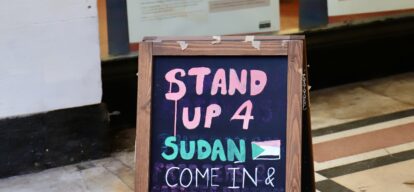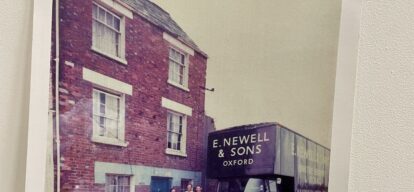‘I Shall Bring You African Lettuce’, in Natty Mark Samuel’s The Encyclopedia of Rootical Folklore opens with “If I could, Lady of the River, I would take the same steps as Prince Seven Seven, past the places of worship and the sculpture of benediction, making my way to you” and ends with the imploring “Tell me, what did Prince bring to you? Honey? Pumpkin? Spinach? When I come to you, Goddess Oshun, I shall bring you African Lettuce.” We are told of Twins Seven Seven's journey, the sole survivor of seven successive sets of twins, an artist inspired by Yoruba mythology who was set to become King of Ibadan before his death. Our narrator can not undertake this journey, cannot visit the Osun sacred grove, cannot offer any more than common African lettuce. It does not matter. Samuels reminds us with every word and image to marvel at the ordinary as much as rarity.
In May, Fusion Arts hosted a book launch for Natty Mark Samuels’ The Encyclopedia of Rootical Folklore: Plant Tales from Africa and the Diaspora, alongside an exhibition of visual art by Moses Bikishoni. Samuels’ book is an A-Z of the flora of Africa and the Caribbean, illuminated by songs, poems, and stories. Samuels set up the African School in Oxford in 2009, creating a hub for African studies which departs from Eurocentric curricula and frameworks. With his book, Samuels connects the nature of Africa and the diaspora with its native folklore, opening up a mode of appreciation away from Western academics.
In an interview with Ox Magazine, Samuels notes that “when we look at plants we tend to look at them as sources of food and medicine. A part of my mission is to re-introduce African folk tales and folklore to the general public because for years they have been under the guardianship of academics”. Academics often disenfranchise nature; colonisation and industrialisation breeds a school of thought in which nature is an object of scientific scrutiny, subjugated to man. Rootical Folklore reintroduces plant life via links with folklore. This connection brings a new sense of wonder to plants and recognises folklore as something organically grown. In ‘Song for Pwo’, they dance for their female ancestors, drawing a line of continuity from Queen Nzinga, to Nina Simone, to the modern woman - all connected through tradition and invoked in a singular act. We are presented with an image of nature's connection to humankind, with the people of Africa and the diaspora, and of its capacity to be experienced rather than investigated.
Samuels’ writing is filled with a constant sense of movement, of a blooming interconnectedness between all things. At our launch event, his writing was apposed with Bikishoni’s art, and with fruits and vegetables raised on plinths. Vegetation is equal with human construction, all characterised by a feeling of fluidity and spontaneity. Words and art grow like plants - what are the chances that all of this came into being together?
Rootical Folklore feels like a descendant of Birago Diop’s ‘Breaths’; “Listen more often to things rather than beings…In the wind hear the sobbing of the trees,/ It is our forefathers breathing.” Sound is yoked with inanimate object, chants and songs arising from flora to give words to ancestral stories. At a reading for Tekano, I first heard Samuels perform selections from the book aloud. Hearing a room of people sing ‘The Pumpkin Chant’ and ‘Coffee Bean Chant’ brings new life to the words on the page. The shared rhythms and melodies enact Samuel’s goal to make us “sit around and tell stories” again. Though not every reader has the opportunity to experience the same, Samuels clearly delineates song within his text, reminding us of the very real folkloric tradition being represented. Our gaze is taken from the words on the page to something beyond it - sound implies being and living. Cultures and traditions arise from their conditions, flora and folklore grow and evolve alongside each other.
I encountered Yoruban folklore in Samuels' writing that was new to me, but its grounding in material, natural forms that gave me something tangible and, often, familiar to connect with. Rootical folklore is a book which not only tells us of new things, but reminds us to look twice at ordinary things and recognise the beauty in them.
The Encyclopedia of Rootical Folklore: Plant Tales from Africa and the Diaspora is available in Blackwells, the Botanic Garden, Daunt Books, and online.
Article written by Fianna O'Shea, Fusion Arts summer intern.













